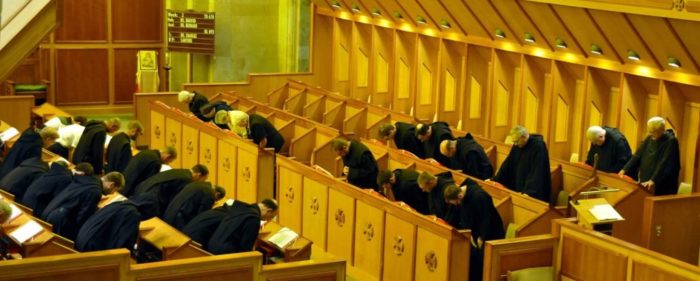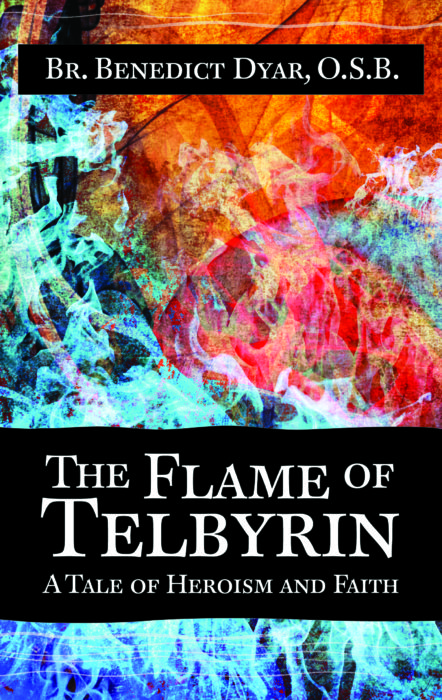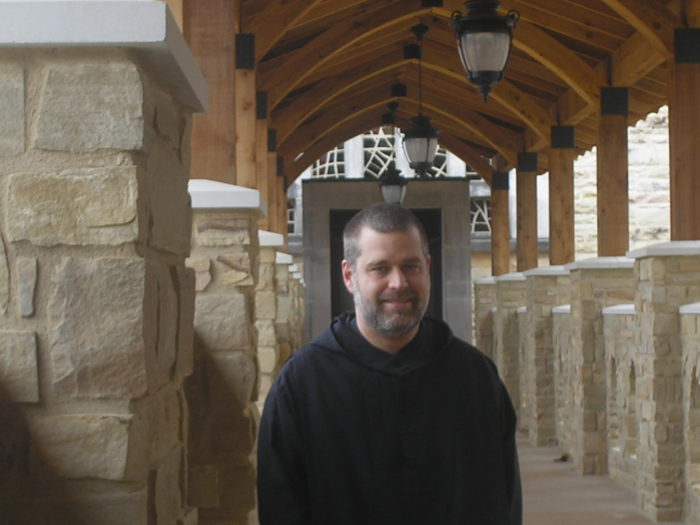Why I Wrote My Fantasy Novel As a Monk
Ever since my childhood I have loved heroes, including heroes of the Bible.
The monastery of Saint Bernard, with its quietness and reflective atmosphere, provides a good place for the hobby of writing.
My origins of this hobby go back to when I first began to write fantastical stories for my mother when I was a child. Fantastical heroes were part of my life throughout my teenage years with the reading of J. R. R. Tolkien, Terry Brooks, and Robert Jordan.
 Every day at Saint Bernard is filled with readings from the Scriptures, both at the Divine Office and in personal reflective reading of the Bible, or lectio divina. Lectio is one of my favorite parts of my day as a monk. Biblical heroes came off the page and my love for fantasy adventure, which never went away in my life, was combined with my love for the Bible.
Every day at Saint Bernard is filled with readings from the Scriptures, both at the Divine Office and in personal reflective reading of the Bible, or lectio divina. Lectio is one of my favorite parts of my day as a monk. Biblical heroes came off the page and my love for fantasy adventure, which never went away in my life, was combined with my love for the Bible.
“How wonderful would it be,” I thought, “to evangelize through fantasy adventure.”
Glorifying God in a fantastical world with Him as the one true God would do just that.
Writing a fantasy adventure story is not the norm for a monk, and I’m still mystified as to why God called me to my vocation. To take a fantasy nerd guy like myself and place him in a monastery is indeed a unique action for God to perform. God continually uses the unlikely for his glorification as he did many of the Biblical heroes. Now I don’t consider myself a hero, but I love my vocation and am inspired by true heroes such as the saints that have gone before us, living or dead, as they are a continual inspiration for me.
So the writing commenced in my early days as a monk. Several attempts to write a fantastical story were done and I asked author friends of mine what they thought. “Try again,” they said. And so I did. However, I was continually concerned for the readers. Because I was continually grieved by dark fantasy and unhealthy fiction in our world, I wanted to give readers a story of light.
Writing material that would “sell” was not really the priority. I wanted to envelope the reader in a God-centered world.
As we Benedictines say: “That in all things God may be glorified.” I couldn’t write a fantastical story apart from that goal.

“Our elven heroes prove charming, and the narrative burns hot and quick.”
—Lorehaven magazine (read full sponsored review)
So I slowly created my own heroes. Finally, fellow author friends, editors and a private publisher were satisfied with The Flame of Telbyrin. Some of the heroes in this story were typical fantasy heroes and some were not.
I also developed the liking for female heroes because I thought that in the early days of fantasy, they didn’t get enough press! There were many heroines of the Bible that I think are important.
Among these heroines of the Bible is a woman named Ruth. As I developed my characters in my book, I modeled the character Larilyn Alandiron after her. I think Ruth’s loyalty to family is especially important today. Family and marriages seem to be falling apart these days and that’s a pity.
Indeed, one of the questions that I commonly receive as a monk is: “Can you leave?” I always answer “no,” because of my loyalty to my brother monks and to the Lord. Vowed life is to be taken seriously and so are marriages. In The Flame of Telbyrin, the married characters, Orilin and Larilyn Alandiron, represent that commitment.
As ideas for the world of Telbyrin gradually developed in my mind (mainly while exercising!), it occurred to me that Christ’s message being intended for everyone was important for us today as well. The Flame in the book represents the Light of Christ. Gnostic heresies have no place in our faith today nor did they in any other time in history.
During the Easter Vigil in the Catholic Church, we come into a dark church first carrying a huge Easter candle. The first words sung are: “The Light of Christ!”
One fan said, “That is like the Flame in your story!”
I appreciated this very much. As people in the ceremony light their candles from the Easter candle, we symbolically pass the Light of Christ to each other just like the different races in The Flame of Telbyrin pass the Flame to each other. Each Christian in this world essentially holds a candle, the Light of Christ, which is not meant to be put under a bushel basket but for everyone to see.
We need heroes in our world today. We have enough negativity and evil messages in our world, especially in the realm of fiction. What I humbly offer to readers and to the world is the Light of Christ and I know that it is by God’s grace that I do so.
The Flame of Telbyrin is available now. Lorehaven magazine says:
“Benedict Dyar’s The Flame of Telbyrin packs a lot of plot into one novel. On a large scale, armies battle each other. On a smaller scale, our heroes must overcome difficulties to reach the king and queen in the city of Gallinthrar, and that’s only the beginning of their struggle. The story roars with action: kidnappings, betrayals, and even encounters with the undead . . .”
Read the early review in Lorehaven magazine’s fall 2019 issue.








































[…] I love to see this spreading, and this was mentioned over on the Speculative Faith website. […]
Gasp, promoting a book by not only a Papist, but one that lives in a communist enclave??!? Fetch me my clutchin’ pearls!
[…] I love to see this spreading, and this was mentioned over on the Speculative Faith website. […]
Hello Brother Dyar. It’s nice to meet you, virtually speaking. I’m not at all surprised that you’d find an interest in expressing your faith in a fantasy tale. Good for you–I wish you well.
I am on the other hand a bit surprised about your comment on Gnosticism. Is Gnosticism actually common in Christianity today? Aren’t we more all about the pleasures of the flesh in a way somewhat parallel to Epicurean thought? I mean, yes, there are modern Gnostics, that’s for sure, but I don’t see they are anywhere close to taking over Christian thought and practice. Am I missing something? Please explain.
Thank you!
Travis,
I agree. Gnosticism is not as prevalent today as it was in early Christianity. However, I had to have a villain in my book. The “bad guys” in my novel, if one wants to call them that, were Gnostic in their thinking.
Also, I think some persons today have a general misunderstanding about monasticism. Many think that we think the flesh is evil or a prison. That is not so. The radical commitments of the monk are the evangelical counsels (for us: communal poverty, voluntary celibacy, obedience, stability, and conversion of life), freely chosen. As you know, certain Gnostics thought the flesh was evil. Monks, like other Christians, believe that the body is sacred since we as Christians indeed believe in the resurrection of the body. But my main point above is that I had to have a villain in the book.
I’d like to continue our conversation. Thank you!
Br. Benedict
Ah, Ok. No problem. I understand better now. Thanks for your reply.